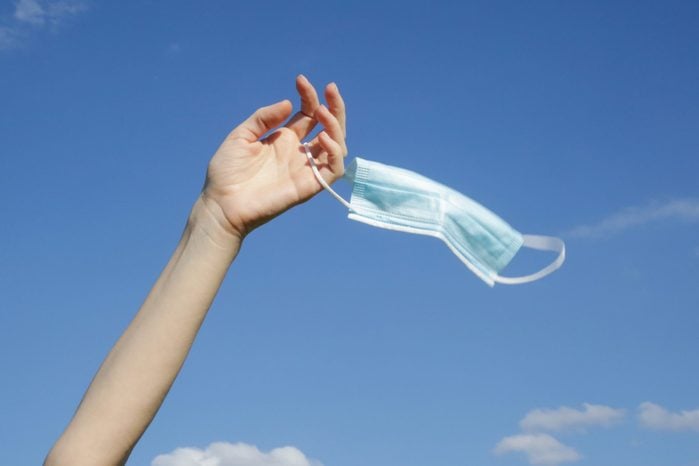The New Covid ‘Breathalyzer’ Test: Specialists Explain Why It Could Be the Best Covid Test Yet
Updated: Apr. 18, 2022

Last week, the FDA gave partial approval to the first-ever Covid breath test. Now, two renowned doctors discuss how the InspectIR Covid-19 Breathalyzer—with its greater than 90 percent accuracy—could revolutionize Covid testing...and what that means for you today.
What is the InspectIR Covid-19 Breathalyzer?
If, until now, you’ve been spared the sometimes tear-inducing experience that is a Covid-19 nasal swab test, you might count yourself among the lucky few. For the millions of Americans who have been personally familiar with the sensation, on April 14, the U.S. Food and Drug Administration (FDA) issued exciting news: the federal public health agency has newly authorized a Covid-19 breath test, which could ultimately mean fewer nasal swabs—and perhaps more importantly, quicker and potentially more accurate results than other rapid Covid-19 tests that are currently available.
In under three minutes, the InspectIR Covid-19 Breathalyzer reportedly spots chemical compounds associated with the coronavirus in breath. The FDA’s green light for the test is not considered to be a full-fledged approval, but instead gives emergency use authorization—a preliminary nod designed to expedite development in light of the ongoing pandemic. Read The New COVID-19 Variant, “BA.2″—Get 9 Facts Straight From Medical Specialists
As far as the rollout and availability of the new test, the FDA noted that makers of the InspectIR Breathalyzer project they’ll produce approximately 100 Breathalyzer tests per week, which can each be used to evaluate about 160 samples per day. “At this level of production,” the FDA stated, “testing capacity using the InspectIR COVID-19 Breathalyzer is expected to increase by approximately 64,000 samples per month.”
How will the new Covid-19 Breathalyzer test work?
The FDA describes the new testing machine as roughly the size of a carry-on suitcase. To find out whether they have Covid-19, an individual will blow into it through a cardboard straw for approximately 10 seconds.
The new Breathalyzer relies on gas chromatography-mass spectrometry (GC-MS) to separate and identify chemical mixtures and rapidly detect five volatile organic compounds within the exhaled breath that are linked to Covid-19 infection. Sources say there is no need to add any solvent or reagent to bind to a sample for analysis.
The Breathalyzer’s less than three-minute turnaround contrasts with a rapid PCR test, which can take up to an hour; and rapid antigen tests, which take about 15 to 30 minutes to provide results.
Think it’s possible you may have had Covid, but tested negative? Read 14 Signs You May Have Already Had Covid-19, Doctors Reveal
How accurate is the InspectIR Covid-19 Breathalyzer test?
In a study of more than 2,400 participants with and without Covid-19 symptoms, the test showed 91.2% sensitivity and 99.3% specificity. (Sensitivity tells you how often a test correctly generates a positive result for people who truly have the condition, while specificity measures a test’s ability to correctly generate a negative result for people who don’t.)
One important note: if you test positive, your result will probably need to be confirmed by a PCR test, which is still considered the gold standard in the world of Covid-19 testing. PCR testing amplifies the genetic information of the virus, commonly known as RNA, which makes it easier to get a more accurate result.
Over the weekend, Otto Yang, MD, Sc.D—an immunologist and physician-scientist specializing in viral pathogenesis at the David Geffen School of Medicine at the University of California, Los Angeles—spoke with The Healthy to put the Covid Breathalyzer’s capabilities in context: “The negative predictive value is pretty good, and it’s better than rapid antigen tests,” Dr. Yang says. This means the breath test is less likely to produce false-negative results than available antigen tests. “This could be a pretty big advantage.”
However, he notes, what role the new breath test will play in the pandemic is not clear quite yet. “This new test could be a useful tool for screening before a big event or entrance into a crowded bar or venue,” Dr. Yang says, adding that “more information is needed to better understand any shortcomings of the test.” For example, certain foods may compromise results on breath tests, and this could be an important consideration when reviewing results
Len Horovitz, MD, a pulmonary specialist at Lenox Hill Hospital in New York City, agrees. “The new breath test will definitely be a more pleasant testing experience, and it looks to be fairly accurate,” Dr. Horovitz explains. Still, the machine will likely be expensive…and as a result, this type of testing may only be useful in hospitals to quickly rule Covid-19 in or out. “We will still rely on home tests and pop-up PCR testing for the near future.”
Do what you can to care for your lungs—read Covid-19 Breathing Exercises for Recovery (and Prevention): Respiratory Therapists’ Step-by-Step Process
Get late-breaking insights about immunity when you subscribe to The Healthy newsletter. Follow us on Facebook and Instagram, and keep reading:
- How to Exercise After Covid-19: Lung and Exercise Science Doctors Share Current Wisdom
- Allergic to Exercise, You Say? Actually, It’s a Real Condition—Here’s an Immunologist’s Take
- The 4 Best Vitamin D Supplements Depending on Your Specific Needs, from Registered Dietitians
- The 10 Best Health Books of 2022: Therapists and Readers Rate the Bestselling Wellness Books So Far This Year
